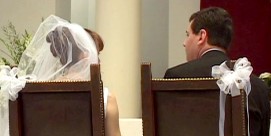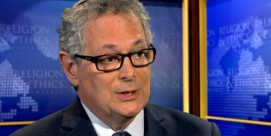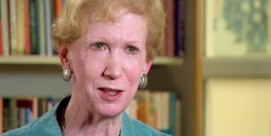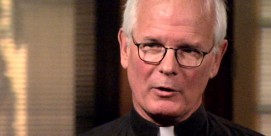In This Episode << SLIDE LEFT TO SEE ADDITIONAL SEGMENTS
Faith and Family in America, Part Two: Religion and Parenting
BOB ABERNETHY, anchor: Now, the next in our series on Faith and Family in America. In a national survey we commissioned, three quarters of all Americans say they believe it’s likely their children will grow up to be of the same religious faith as their parents, but more than half say they worry about that. Betty Rollin reports on the parents and children of four religious traditions in three very different families.
BETTY ROLLIN: A special prayer clock calls the Ashmawi-Ibrahim family to prayer five times a day. Hassan was born in Egypt, his wife Salma in Kuwait — both into religious Muslim families. Now in Centreville, Virginia, it is of utmost importance to them, they say, to keep their religion strong among their four children.
HASSAN IBRAHIM: To us religion is not just a practice; it’s a way of life. It’s part of the value system.
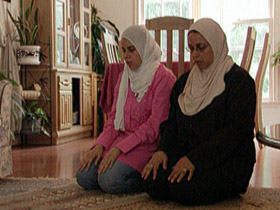
SALMA ASHMAWI: They know that every day they have five times that they stand before God and that they are meeting God — basically they have an appointment with God, so there is a self-discipline. How can they stray between five times prayers and know that they are going back to stand before God, and keep that appointment knowing they just did something that they shouldn’t?
ROLLIN: Has any one of your children ever said, “I just don’t like praying so much”?
Ms. ASHMAWI: Everybody tries to get out of prayer when they are still young. They all do. You have to remind; you constantly remind.
Mr. IBRAHIM: Yeah, you cannot force them. You cannot drag them to pray.
ROLLIN: Professor Brad Wilcox of the University of Virginia studies religion and the family.
Professor W. BRAD WILCOX (Department of Sociology, University of Virginia and Resident Fellow, Institute for American Values): The parents who are more religious and are affectionate and firm with their kids are likely to ensure that they will transmit the faith that they have to their children. Parents who are too strict with their kids, who are authoritarian parents, are more likely to see their children rebel, both with respect to their moral beliefs as well as their religious beliefs.
ROLLIN: There seems to be little rebelling in this family. Ayah is 20 years old and goes away to college.
AYAH: There’s a lot of temptation. You are away from home for the first time and you look around you and everybody is just doing exactly what their parents don’t want them to do. I know that I don’t want to do those things. So, how am I going to keep myself busy and keep myself motivated? And I was able to do that by keeping strong in my faith.
ROLLIN: Like many religious parents, Salma and Hassan are active in their children’s public school. One area that troubles them is how sex education is taught.
Mr. IBRAHIM: It seems sometimes that they are forcing on the children maybe values that are contradictory to our beliefs.
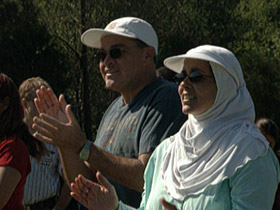
ROLLIN: As Muslims, the Ashmawi-Ibrahim children have special challenges with their peers. Mohamad is 12.
MOHAMAD: I was running the mile in school, and I was saying verses from the Qur’an, and I was saying them out loud. And every time I ran by someone or someone ran by me, they would stop and they would be like, “What are you saying? What are you doing?”
ROLLIN: Nada is 15.
NADA: Sometimes, you know, in school you just want to fit in. You don’t want to be different. But I just find a group of friends that kind of accept me for who I am.
ROLLIN: Nada’s parents would like her to cover her head like her sister Ayah, but they don’t push it.
NADA: It’s my choice. When I’m doing everything else perfectly and when I feel like I’m completely ready for it, I feel like that’s when I’ll take that step.
ROLLIN: Muslim women are supposed to dress modestly — a problem for Salma when she shops with Nada.
Ms. ASHMAWI: Blouses are too short. They barely cover her stomach. If you find something that covers the stomach, it doesn’t cover the top. I tell you!
Mr. IBRAHIM: My son who is 22 went through high school without dating, went through college without dating. I mean — that is the most difficult thing. And when I go to pick him up from school and see how the girls are dressed, I say I really sympathize for him. It’s very, very difficult.
ROLLIN: For many conservative Muslims, going out with the opposite sex, except as a prelude to marriage, is forbidden.
NADA: I do have friends that are guys. And so occasionally, like if we all want to go bowling or to the movies, I might ask to do that, but they feel strongly against it, and I think that I’ll probably understand why when I’m older. But I do kind of argue with them about that.
ROLLIN: Who wins?
NADA: They do!
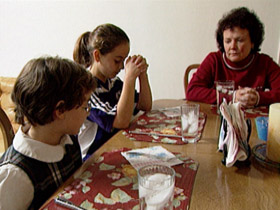
ROLLIN: Judy Costello is a single mother in Bethesda, Maryland.
JUDY COSTELLO: I was married in 1989, expected to be happily married ever after. I was married in the Catholic Church. We had four children: Michael was born in 1992; Julianne is 11; Daniel is nine; and Naomi is five. Ultimately we were separated in 2002 and formally divorced in 2003.
As a single mother, I face the challenges of limited time and financial resources. As a Catholic single mother, I face the challenge of working to role model the Catholic teachings for my children without having two parents in a household to practice what we’re preaching.
ROLLIN: The divorce tested Judy’s faith, but ultimately it was her faith that helped her through it.
Ms. COSTELLO: To me, our religion — Catholicism — is about loving others and treating other people the way you want to be treated, having a respect and love for God, family, and friends, and even those who aren’t as respectful towards you. With that overriding framework, it helps me help our children make choices in their daily life.
JULIANNE: Naomi couldn’t find her backpack before we went to school and I knew I didn’t want to be late, but I remember it’s better to help people than to think of ourselves. So I stayed and helped her look for it.
ROLLIN (To Naomi): What do you pray for?
NAOMI: I pray for family and friends to be safe and for victims of Hurricane Katrina and for them to find their moms and dads, ’cause a bunch of people, they don’t have water, food, and they miss their moms and dads.
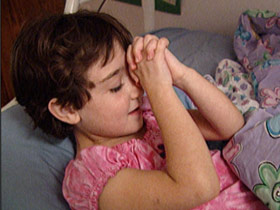
ROLLIN: Do you pray for yourself?
NAOMI: Like, I pray for nothing bad to happen.
ROLLIN: Is religion good for children? Professor Wilcox says yes.
Prof. WILCOX: Parents whose kids are more religious are likely to see their kids do slightly better in school and also to see their kids to be much less likely to be involved with alcohol and drugs, to be delinquent or to experience psychological distress, things like depression, for instance.
MICHAEL: It’s, like, burned into my consciousness — stuff like, “Don’t drink alcohol. Don’t do drugs. Don’t smoke.” I don’t want to, like, disappoint my parents or God or anybody by doing the wrong thing.
Ms. COSTELLO (To Kids): Who’s got what? Naomi, Julianne — dance. Michael, get your soccer stuff.
ROLLIN: Religion is not the only thing this family is busy doing. There is soccer for Michael, tap dancing for Naomi, and modern dance for Julianne. Judy has managed to make all of this work while holding down a full-time job, often done on her lap — which is not to say she doesn’t worry.
Ms. COSTELLO: I am most worried almost in the innocence of our children. I try to give them enough information so that they can make the right choices, but I get the sense that in a couple years my children will be surprised by the things they didn’t know.
ROLLIN: Of course, part of every parent’s job is to worry about the children. Our poll reveals that religious conservatives in particular — more than half the number of traditional Catholics and almost as many evangelical Christians — worry about their children seeing too much sex and violence on TV, video games, and in the movies. Many parents hope that religion will not only instill better values in their children but protect them from these negative influences in the culture.
And what about families with two religions? Meet Eric Nelson and Sarah Anders of Rockville, Maryland and their children, 14-year-old Faith and 10-year-old Marc.
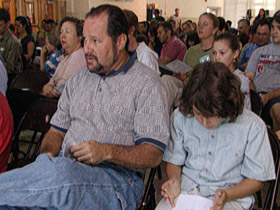
ERIC NELSON: I grew up a Reform Jew. Both sets of grandparents came over from Belarus, very hard, under very hard circumstances. Neither of my parents really wanted to force us to go to services like they were forced to. But I still identify myself as a Jew, consider myself a Jew.
SARAH ANDERS: I was brought up a Southern Baptist in Little Rock, Arkansas. I came from a very religious family, and both of my parents came from families who were Southern Baptist and very active in their church.
ROLLIN: Ultimately, their parents accepted their marriage. Even so …
Ms. ANDERS: I do have an aunt who is very Baptist and lives in Atlanta, and she prays for Eric every day that he will be saved, that he will come to know Jesus.
ROLLIN: It’s Sunday morning. Sarah and her daughter Faith are at Christ Congregational Church. A few blocks away, Eric and Marc are singing Jewish prayers at IFFP, the Interfaith Families Project, a community of Jewish and Christian families where both religions are taught and celebrated.
Ms. ANDERS: Once I started taking Marc and Faith to church, he really sat up and said, “Wait a minute, this is not going to work. We have to do something different.” And we were lucky we found out about this interfaith families group and went to a picnic at one of the member’s houses. And I remember going out on their back porch and looking at this sea of people and saying, “Finally, a place where we belong.”
Mr. NELSON: The reason why we ended up coming up with what we did, which is essentially a compromise, is because I really kind of felt that I was betraying my traditions and my roots and, you know, all my relatives who were killed for being Jews, by not pitching in and making sure that our children at least had an understanding and an exposure to my tradition and where I came from.
ROLLIN: Suppose your children decide to be Jews?
Ms. ANDERS: I knew you were going to ask that. I knew you would ask that. As long as they have a spiritual life, I don’t care.
ROLLIN: I’m not convinced.
Ms. ANDERS: No? It’s deeper and more complicated than that. It’s the intimacy of the religion; it’s what I know. It’s the language of belief that I know. I love the rituals in Judaism, but it’s not in my blood.
ROLLIN: What if your children become Christians?
Mr. NELSON: The biggest disappointment to me would be the loss of the heritage and the loss of the tradition and the loss of the identity.
ROLLIN: In the last 40 years there has been a marked increase in interfaith marriages. What effect does this have on the children?
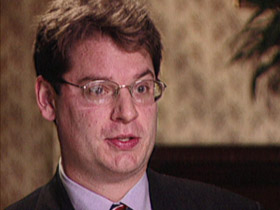
Prof. WILCOX: It makes them less likely to be religious both as teenagers and as young adults; there are some risks in terms of delinquency and depression. On the positive end of the ledger, I would say that these kids tend to think for themselves more than other children, and they tend to have a better sense of how different traditions relate to one another or don’t.
ROLLIN: Are they more tolerant?
Prof. WILCOX: They’d be more tolerant, typically. That’s right, yes.
Ms. ANDERS: Hopefully they will wind up with more tolerance and an openness to people being whatever they are. But I think, realistically, I think the day-to-day challenges, just the logistics, going to Interfaith, going to church, doing Rosh Hashanah, doing seders, doing Hanukkah, doing Christmas — it’s sort of a mess. So it’s very busy, and sometimes I wish, “Oh, why can’t we just have Easter, and just only Easter!”
Mr. NELSON: Easter being one of the more difficult holidays.
Ms. ANDERS: Yes!
ROLLIN: Children of interfaith marriages are more likely to question religion.
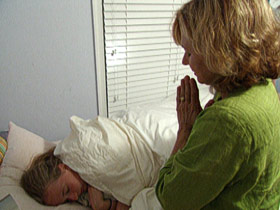
FAITH: Sometimes I don’t think God is real, because sometimes I’ll say prayers and my prayers won’t come answered. So I’ll be, like, “Yeah, you are not real. Bye.” But then, you know, after all you learn, all the miracles that happened, you kind of have to start to believe that someone is looking over you and is looking over our country.
MARC: I have scientific explanations for about everything they say God has done. The world started from bacteria. The parting of the Red Sea, tides coming in — they just didn’t know what the heck that was.
ROLLIN: So you question what you learn in religion; you just don’t accept it?
FAITH: Well, you accept some of it but, I mean, you question a lot of it. I think you question more than you accept.
MARC: That’s mostly it.
ROLLIN: Studies show that at age 16 and 17, children from one-faith families may start to question religion as well, as they grow more independent from their families. But when they marry and become parents themselves, they often return to religion, if only to pass it on to their children.
For RELIGION & ETHICS NEWSWEEKLY, I’m Betty Rollin.


